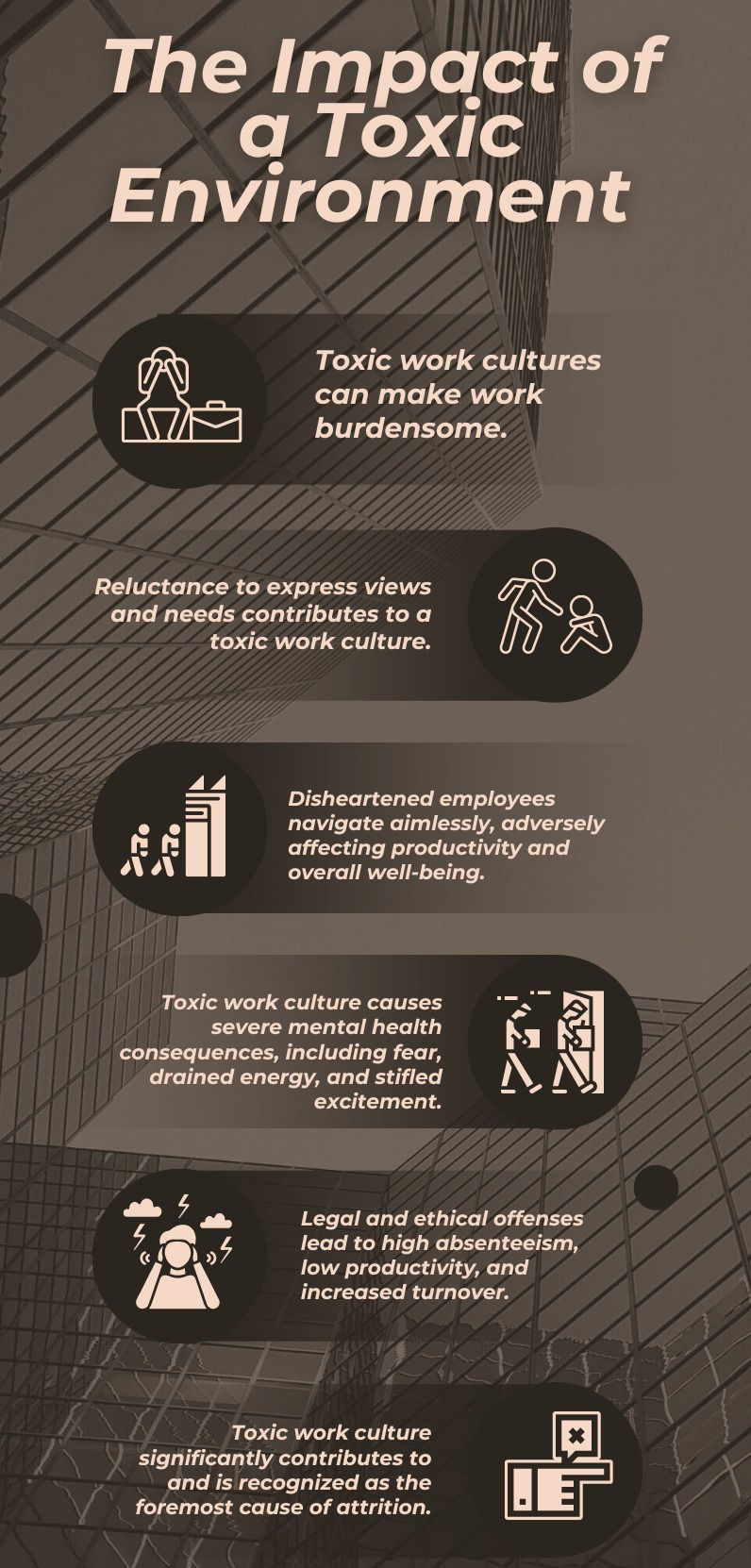Toxic Work Culture: The Silent Killer in the Workplace
- Vrunda Chauk
- Feb 20, 2023
- 4 min read
Updated: Jan 29, 2024
Are you one of those people who dread Mondays because it means going back to work?
This could be a sign that you are experiencing a toxic workplace culture.
We all are aware of the negative effects of a toxic workplace culture. A toxic work environment can cause employees to feel disengaged and demotivated, leading to high turnover rates. Employees who work in a toxic work environment may feel undervalued and unsupported, which can impact their job performance. This can lead to missed deadlines, errors, and decreased quality of work.
What makes a company culture toxic?
Toxic workplace culture is manifested in many ways. A few of them are -
Bullying at the workplace - Despite many efforts to prevent bullying and harassment at the workplace and forming various policies regarding the same, workplace bullying unfortunately still exists. It can take many forms, like gossiping or spreading rumours about colleagues, constant public criticism, physical violence and sexual abuse. According to a US bullying survey around 48.6 million Americans have been bullied at some point in their workplace. Another survey stated that 55% of Indian workers were bullied at their workplace.
These numbers are alarming, suggesting that bullying at the workplace is increasing. Bullying in the workplace can have a serious impact on employees and the organization as a whole. Employees who are bullied may experience high levels of stress, anxiety, and depression.
2. Micromanagement - Micromanagement is a management style where managers closely monitor and control every aspect of their employees' work. One of the main negative impacts of micromanagement is that it can make employees feel undervalued and unsupported. When managers are constantly looking over their shoulders and criticizing their work, it can lead to feelings of frustration, stress, and burnout. It can also lead to a lack of trust between employees and management, as employees feel that their expertise and experience are not valued.
One survey conducted by Trinity Solutions revealed that around 79% of the employees said that they have experienced micromanagement from managers they worked with. 62% of the employees agreed that they were thinking of changing jobs because of micromanagement.
3. High-pressure work environment - This seems to be one of the most common causes of toxic workplace culture. This can be reflected in every day work as tight deadlines, high performance expectations, long hours, and a lack of support or resources. While some level of pressure can be motivating and help employees perform at their best, a consistently high pressure work environment can have negative impacts on employees. This can lead to higher levels of stress among employees eventually resulting in burnout.
In toxic cultures, being a workaholic is normalized and sacrificing sleep is glorified. The best way to get ahead is to burn out - Adam Grant
According to a survey conducted by The American Institute of Stress (AIS) 40% of employees report that their job is extremely stressful. Another research conducted by the Health and Safety Executive (HSE), reported that work overload is the most common cause of stress at work (44%).
4. Lack of diversity and inclusion (DEI) - As the world became more connected with the internet, people were able to work from anywhere in the world. This gave rise to diverse teams, with people from different nationalities, speaking different languages, from different cultures and ethnicity working together. This diversity is good for organizational growth and development. When an organization lacks diversity, it can limit the range of perspectives and ideas that are brought to the table. This can hinder the organization's ability to evolve and can ultimately harm its ability to compete in the marketplace.
A survey conducted by Glassdoor reveals that 3 out of 4 job seekers and employees value diversity and inclusion while choosing to work for a company.
These are few of the common consequences of a toxic workplace culture.

Does your organisation have a toxic work culture?
Here are a few questions you can ask yourself, in this regard.
Do you and/or your colleagues struggle to maintain a work-life balance?
Have you experienced a burnout due to stress at work?
Do you hear a lot of rumors and gossips at work? Does that lead to excluding certain people from social interactions?
Do you and your colleagues constantly experience lower levels of motivation when you are in the office?
Have you/someone you know experienced bullying at the workplace?
In conclusion, a toxic work culture can have significant negative impacts on an organization and its employees. To address a toxic work culture, it's important for organizations to create a culture that supports employee well-being and work-life balance. This includes creating a safe and inclusive work environment, implementing policies that promote work-life balance and mental health support, and taking proactive steps to prevent workplace bullying and harassment.

We also recommend you to watch this interview with Zoe Fragou on Why is it so difficult to talk about Toxic Cultures. Zoe is an organizational psychologist - she is a fixer of TOXIC WORK CULTURES - she uses science to help organizations transform their culture Her research is mainly focused on the psychometrics of the corporate culture.
If you enjoy this episode - follow the Growth Hacking Culture Podcast.

Comments